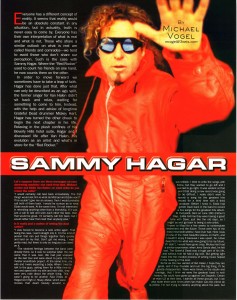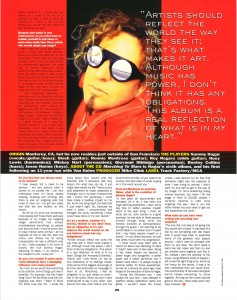
(click on picture to open file)
By: Michael D. Vogel
© May 8, 1997. Michael D. Vogel. All Rights Reserved.
Published in:
The Album Network magazine– May 23, 1997
Free Gotham – January 13, 2011
Everyone has a different concept of what reality is. On the surface, it would seem, by definition, reality would be an absolute constant in any situation. As always, truth is never easy to come by. Everyone has his or her own interpretation of what is real and what is not. Those who share a similar outlook on what is reality we call our friends and comrades and those that don’t we tend to avoid. Such is the case of Sammy Hagar. Where the “Red Rocker” used to count his friends on one hand, he now counts them on the other.
In order to move forward we sometimes have to take a jump or “a leap of faith.” It’s really all about getting things started, finding new ways of solving problems and making your presence felt. Sammy Hagar has done just that. After what can only be described as an ugly split, the former lead singer for Van Halen didn’t sit back and relax, waiting for something to come to him. Instead, with the help and advice of Mickey Hart, the Grateful Dead’s longtime drummer extraordinaire, Sammy has turned the other cheek to begin the next chapter in his life. Relaxing in the plush confines of his Beverly Hills hotel suit, Sammy and I discussed life after Van Halen, his evolution as an artist and what the future holds in store for the “Red Rocker.”
There are three messages on your answering machine: One from God, another from Michael Jordan and a third from Eddie Van Halen – Do you return any of the calls? In what order?
Sammy Hagar: “I would certainly call God back immediately. The first thing I would ask him is what does Michael and Eddie want from me? If he couldn’t give me an answer, then I would probably call both of them back. I would be curious as to what Eddie would want. At the same time, I’m not interested in rekindling anything other than a friendship. If it were just a call to talk and wish each other the best, then that would be great. I’d certainly call him back but I would rather hear from God than anybody else.”
Is it really just a matter of letting the dust settle?
SH: “I was forced to become a solo artist again. That being the case, I went straight ahead into it. I’m the kind of person that can pull things together fairly quickly and land on my feet. Don’t get me wrong, I was pretty mad, but there is only so long you can dwell on it. I didn’t want to sit around and procrastinate nor did I want I want to take much baggage with me.
“The strained feelings between the band were already there so it was no surprise when the call came that the band was over. We had just wrapped up the last tour and were about to jump into the Twister soundtrack project. At the same time, my wife and I were expecting a baby. When I tried to talk to the guys asking them for a little time to rest and spend with my wife and new child, they were very rude about the whole thing. This wasn’t going to be another Fast Times At Ridgemont High or Heavy Metal, which were movies that dealt heavily around a soundtrack. I tried to write the songs with Eddie, but they wanted to go left and I wanted to go right. It was evident at this point that doing a new record was going to be difficult. I really didn’t want to record a song for the greatest hits record for a third time with a third producer. Before I knew it, Eddie had gotten Dave back in the band to record a few songs for the greatest hits album. At that point, at 9:00 a.m. on June 16th (Father’s Day), Eddie told me they were having a great time with Dave, just like the old days, so I might as well go back to being a solo artist.
“Eddie and I could sit down and write another great record tomorrow; but the point is, I was forced to become a solo artist again. I went to Maui for a few weeks to contemplate retirement and the future. Those were two of the most miserable weeks I have ever had. Here I was in one of the most beautiful places on Earth and I couldn’t enjoy it because I was upset. So I dove head first into what was now going to be my future. If I didn’t, I would have gone crazy. Mickey Hart had a similar experience he shared with me. When Jerry Garcia died, he felt lost. The Grateful Dead was a huge part of his life and without that he had a big void. So, but getting right back into the creative process of writing music helped in the healing of the soul.
“As far as the new version of Van Halen, I hope they are great and if they flounder and ruin this big thing, I’ll be greatly disappointed. There were times, in the studio and onstage, that I think we were the greatest band in rock history. We could have gone up against Led Zeppelin, Cream or even U2 at their best. I admire all these groups but I can also state there were times when Van Halen was the crème de la crème. I’m not trying to destroy anything about the past but rather preserve it. I would like our history as a band to be put on a pedestal so that it may be seen as special as it really is. So, I’m still holding the banner for Van Halen to help preserve our past.”
Is it necessary for interviews to be very confessional, otherwise the public may tend to lose interest?
“I have always been that way. I feel a need to bear my soul because I always want to be truthful. Part of the reason I think I have been around for so long is that I have been honest with my fans. I think they trust and believe in me and the last thing I want to do is change that. For example, I have never endorsed a product that I don’t use personally or believe in. I play Washburn guitars so I endorse them. I love Cabo San Lucas, so I try and convince people to come and enjoy the city’s beauty. I don’t ever want to be put in a position where I tell people what to do, like, Drink Milk. Above all honesty is the best way to promote something. I really feel if I don’t bear my soul at all times, then I’ll erode at the level of trust I have built with my fans.”
Because your music is very confessional, do you often have to explain yourself in much more depth than those artists who record simple pop songs?
“I feel I have run out of that. Back in 1972, I wrote `Bad Motor Scooter,’ which was a pop rock semi-hit. On the other hand, `I Can’t Drive 55’ was a big success, both to the fans and various law enforcement agencies. The song was an honest statement, being written shortly after receiving a ticket. Throughout my career, I have written several pop songs, with Van Halen as well as on some of my solo material. I don’t go about trying to write a pop song, they just end up that way. It is for that reason that I try to be soul bearing in my songs in order to take Sammy Hagar to the next level as well as being different from everyone else.
“I love songwriting especially if I make so sort of connection with the fan. The best way to do that is to keep exposing truth and honesty. Real true-life experiences aren’t always the biggest radio hits, but the do tend to touch people a little deeper, creating a bigger impact. These are the kinds of songs I try to write. `Where Eagles Fly’ is a good example of a song that reaches people at a very deep level. Personally, I don’t care about a pop melody that’s fun to sing if I can’t make a personal connection. When everyone can feel the same thing in the deepest form possible, then a higher force can come into being. This ultimately should reveal the presence of God.”
Do you find that you always need to be serious or are you done fooling around?
“I have always felt a need to be serious. I am very serious when it comes to my private life. I am very methodical when I’m home, always reading, studying and thinking. But there is also an outgoing side that loves to have fun. I’ve got two sides and both are very evident on this record.
“As far as my lyrics are concerned, most people don’t take them seriously of my image. My outgoing stage personality has always over-shadowed everything so people just assume that I must be some sort of crazy maniac party animal. I am so opposite of that in real life. Even the critics who dislike me for being irresponsible will see a different side of me. I have exposed a lot more of myself, the true Sammy Hagar. Marching To Mars, in my opinion, is the closest to who I really am.”
Do you ever wonder if some music could ultimately have a damaging influence over some people?
“As much as we would like everything to be positive, some things just aren’t possible. For example, the Van Halen song `Don’t Tell Me What Love Can Do’ originally was titled `I Want To Show You What Love Can Do.’ I wrote the lyrics about Kurt Cobain with the intention that if someone had truly shown him what love could do, it just might have saved his life. That is a very bold statement to make, especially in hindsight, but in my heart I believe that had I known him personally, I could have made a positive impact on his life. As for the song itself, the band felt it just wasn’t right. So, because we were a band, I compromised and changed the lyrics, something I never would have done on my own record.”
Art as a medium, whether it’s movies, theater or any other form, has an obligation to try and improve the world around us. Do you believe music has any obligations?
“Artist should reflect the world the way the see it, that’s what makes it art. Although music has power, I don’t think it has any obligations. This album is a real reflection of what is in my heart. Songs like `Amnesty Is Granted`, `Karma` and `Little White Lie` are all true reflections of my feelings inside. While some of the biggest pop songs of all time were senseless with absolutely no message to them at all. Personally, I feel an obligation to try and reflect on what I see in the world. When you don’t have anything left to say in your heart, look around and see what nature and the environment provide. All you need to do is stop, look and listen to what is gong on in the world around you.”
From pre-Montrose to post-Van Halen what is the evolution of Sammy Hagar?
“It has been all documented and recorded. All in all, it has been one huge learning experience. I learn everyday how to better express myself, which is the best think, I think, an artist can do. John Lennon is a good example; he was able to freely express himself through song, while Jimi Hendrix excelled at self-expression through his guitar. I am learning to be comfortable in my career and in myself that I may freely expose myself on a record. I’m not afraid anymore, so that has pretty much been my progression.
“I never would have been able to record an album like Marching To Mars if I hadn’t been part of Van Halen. I’ll be the first to admit it; being in Van Halen helped me become a better singer and songwriter, a better player and a better performer. But it doesn’t stop there. I’m always trying to become better. All those experiences, as well as a divorce six years ago, have helped in the evolution of Sammy Hagar.
“During the Montrose era, I was always the rock star. I was dressed in platform shoes, bellbottom pants and glitter. I wouldn’t leave the house unless I was decked out for fear that someone might see me opposite of what I was trying to portray. I was a wild and crazy man throughout the 80′s. I didn’t want my true self to get in the way of my image. I could run faster, scream louder, jump higher and play faster then anyone else. I’m not a screaming raving maniac anymore, but when I hit the stage, in front of 20,000 people, I certainly become a little more outgoing. So you can either retreat into your shell or get out and experience the world.”
What risks do you take when writing and recording new material?
“The only risk I can see is not going into this record with a band. It was less of a risk by not competing with Van Halen then it would have to assemble some of the greatest rock players around. I didn’t want to compete with them on any level. You don’t leave a band like Van Halen and then try and put another band together just like it. So, instead I went the direction of the blues, using different kinds of players, I felt it was the right thing to do. As far as the line-up for the record, it was a lot less methodical then you would think. The synchronicity of the event and good karma helped everything to come together. As long as the music sounds good in the end, then there really aren’t any risks involved.” ^m^
Photograph credit: Melanie Nissen
Origin:
Monterey, CA, but he now resides just outside of San Francisco
Discography:
Sammy Hagar:
Marching To Mars (Track Factory/MCA, 1997) Musical Chairs (Capitol, 1981)
I Never Said Goodbye (Geffen, 1987) Street Machine (Revolver, 1979)
VOA (Geffen, 1984) Danger Zone (One Way, 1979)
Three Lock Box (Geffen, 1983) Sammy Hagar (Green Light, 1977)
Standing Hampton (Geffen, 1981) Nine On A Ten Scale (One Way, 1976)
Hagar Schon Aaronson Shriev (aka (HSAS)
Through The Fire (Geffen, 1984)
Van Halen:
Balance (Warner Bros., 1995) OU812 (Warner. Bros., 1988)
For Unlawful Carnal Knowledge (Warner Bros, 1991) 5150 (Warner Bros., 1986)
Montrose:
Paper Money (Warner Bros, 1974)
Montrose (Warner Bros, 1973)
Line-Up:
Sammy Hagar – Vocals, Guitar & Bass
Guest Musicians:
Slash – Guitar Mickey Hart – Percussion
Ronnie Montrose- Guitar Giovanni Hildalgo – Percussion
Roy Rogers – Slide Guitar Bootsy Collins – Bass
Huey Lewis – Harmonica
About The Current CD:
This is Sammy Hagar’s tenth solo release/sixth major label studio album and the first to be release by the Track Factory/MCA following an eleven-year run as the lead singer for Van Halen.
Produced By:
Mike Clink
Label: Website:
Track Factory/MCA www.redrocker.com
© May 8, 1997. Michael D. Vogel. All Rights Reserved. This originally appeared on the Vogelism blog at https://www.vogelism.com, authored by Michael D. Vogel. This article may be shared or reprinted as long as this entire copyright message, including the source location of this article, accompanies it.














 Welcome to Michael D. Vogel’s online portfolio. I am a Los Angeles-based music journalist/content creator, and self-professed music-fanatic/radio-aholic. With more than 20 years of experience in multiple facets of the music industry including; music programming/air talent for terrestrial and internet radio as well as record label artist promotion, I have a finger on the pulse of what's new and under the radar in the emerging music scene. Areas of specific expertise include, but not limited to: rock (heritage, mainstream, heavy metal/hard rock and alternative), pop and adult contemporary, as well as radio, pop culture, sports, exercise and politics. I am applying my passion for music as a freelance writer for the Examiner as National Music Examiner (Examiner.com) in addition to West Coast Editor for FreeGotham (FreeGotham.com). Find me at michael@vogelism.com.
Welcome to Michael D. Vogel’s online portfolio. I am a Los Angeles-based music journalist/content creator, and self-professed music-fanatic/radio-aholic. With more than 20 years of experience in multiple facets of the music industry including; music programming/air talent for terrestrial and internet radio as well as record label artist promotion, I have a finger on the pulse of what's new and under the radar in the emerging music scene. Areas of specific expertise include, but not limited to: rock (heritage, mainstream, heavy metal/hard rock and alternative), pop and adult contemporary, as well as radio, pop culture, sports, exercise and politics. I am applying my passion for music as a freelance writer for the Examiner as National Music Examiner (Examiner.com) in addition to West Coast Editor for FreeGotham (FreeGotham.com). Find me at michael@vogelism.com. 